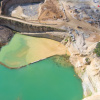 The remote mountain area in the region of Transylvania in Romania, called Ro?ia Montan?, has gold and silver reserves worth at least 14 billion euros. The predominantly Canadian investor group “Ro?ia Montan? Gold Corporation” wants to extract the precious metals using cyanide extraction methods. The company has faced huge protests for more than a decade and these have stalled the development of the project to a large extent.
The remote mountain area in the region of Transylvania in Romania, called Ro?ia Montan?, has gold and silver reserves worth at least 14 billion euros. The predominantly Canadian investor group “Ro?ia Montan? Gold Corporation” wants to extract the precious metals using cyanide extraction methods. The company has faced huge protests for more than a decade and these have stalled the development of the project to a large extent.
Environment, Conflict and Cooperation (ECC): What are the main problems associated with the mining project?
Alina Banu (AB): The problems associated with this project are extremely complex and it is hard to say which aspects are more important than others. We have primarily the environmental aspect and the immense destruction that this project would bring if it is approved: Four mountains will be erased from the earth`s surface, a village will be resettled and the Corna Valley and Corna village will be “replaced” by a huge toxic waste-dump. The entire area will be destroyed and all we will be left with is a lunar landscape. Furthermore, we have the social aspect: there are families, mostly farmers that were born here, who do not want to sell their houses and land and who do not want to move away. The mining project has split the community in opponents and supporters of the project and even relationships between family members have turned increasingly tense. Ro?ia Montan? is the oldest Romanian mining settlement and it hides archeological treasures of inestimable value, kilometers of ancient Dacian and Roman galleries, as well as other types of mining galleries. Alburnus Maior, a non-governmental organization based in Ro?ia Montan?, and the leader of the „Save Rosia Montana“ Campaign are opposing the resettlement plan that will affect 740 farms and 140 apartments, the destruction of valuable historical and archaeological heritrage, the use of cyanide leaching technology and the large-scale extraction of gold via open cast mining.
ECC: How are you working for change? Please tell us about a campaign your organization has conducted.
AB: There is a large number of actions that we have organized throughout the years in order to sound the alarm about the dangers that this mining project would bring and about the illegalities committed. Our activities reach from petitions to open letters, from flash-mobs to demonstrations or the boycott of persons or companies involved. Over time, Alburnus Maior has won over 50 court cases against the Gold Mining Company and different authorities. The most visible event of the campaign is FânFest (the literal translation of fân is hay), an alternative festival that we organize every summer in Ro?ia Montan? since 2004, reuniting the most active voices from Romania concerned with ecology. The invited artists perform for free in order to show their support and to protest against the possible destruction of the region. This year, the FânFest has taken place between 15-19 August to celebrate the unique archeological and natural landscape of Ro?ia Montan?. The festival also aims at supporting the local community that has kept resisting for more than 14 years, as well as to demonstrate that Ro?ia Montan? is a place which could live from tourism and other alternative activities.
 ECC: How do you judge the recent debate about a Romanian law that would empower private companies to evict people from their properties?
ECC: How do you judge the recent debate about a Romanian law that would empower private companies to evict people from their properties?
AB: It is actually a proposed change of the actual mining law that would allow companies to assume the role of authorities and to evict people from their properties, even for projects that are private and not in the public interest. It is common sense that such proposals are incompatible with the property rights guaranteed by the constitution and that they are against the basic principles of democracy.
ECC: The conflict has already been flaring for roughly a decade. How can this stalemate be overcome? In this regard, do you view the debate in the European Parliament over prohibiting cyanide extraction methods as a promising avenue?
AB: All we demand from the Romanian authorities is to respect the existing laws and to think first in terms of sustainable, long-term development, instead of easy profits for their own sake. Hungary, Bulgaria and other European countries have enacted legislation that bans cyanide-based technologies for mineral extraction, as it is known as an extremely polluting method. A European law that prohibits this method would be a guarantee that this area will remain as it is – also for our children.
ECC: Alina Banu, thank you very much for this interview.
The pictures are courtesy of photographer Sebastian Florian.









